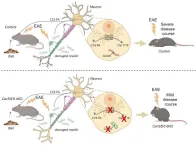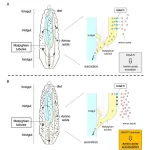(Press-News.org) Socioeconomic factors such as education, occupation, and wealth influence the likelihood of developing cognitive impairment or dementia in later life and whether a person is likely to recover, finds a new study led by UCL researchers.
The research, published in Scientific Reports, followed 8,442 adults aged 50 and above in England over 10 years from 2008/09 to 2018/19, to examine how socioeconomic factors at the start of the study were associated with changes in cognitive status.
The researchers tracked how these people moved between various states: healthy, mild cognitive impairment, and dementia. They also considered the possibility of reversals, where individuals improved from a mild cognitive impairment state to a healthy one.
Information on socioeconomic factors was collected through a self-completion questionnaire. Cognitive impairment was determined using a mix of sources, including participants’ reports of a doctor’s diagnosis, cognitive test results, and their own reports of symptoms and complaints, providing a full picture of each participant’s cognitive health. In addition to these aspects, the study also accounted for demographic factors, such as age, sex, and marital status.
By estimating the time spent in each cognitive state and the likelihood of transitions to neurocognitive disorders such as cognitive impairment and dementia, the researchers were able to gain a comprehensive understanding of how socioeconomic factors impact the progression of a person’s disorder, as well as the duration spent within each cognitive state over time.
The team found that people from more socioeconomically advantaged backgrounds – particularly those with post-secondary school education (such as university or college), managerial or professional-level occupations, and those in the wealthiest third of the population – were less likely to move from a healthy cognitive state to mild cognitive impairment, or from mild cognitive impairment to dementia compared to those with primary education (no higher than secondary school), working in manual or routine occupations, and in the most socioeconomically disadvantaged third of the population.
For instance, having a post-secondary education level was linked with a 43% lower chance of moving from a healthy cognitive state to mild cognitive impairment.
Meanwhile, being in the wealthiest third of the population was linked with a 26% lower chance of shifting from mild cognitive impairment to dementia.
Notably, these advantaged individuals were also more likely to recover from mild cognitive impairment and return to a healthy cognitive state, with wealthy individuals being 56% more likely and those with post-secondary education level or working in manual occupation being 81% more likely to improve, compared to socioeconomically disadvantaged individuals.
Senior author Dr Dorina Cadar (UCL Department of Behavioural Science and Health and Brighton and Sussex Medical School) said: “Our study highlights the critical role of wealth, education, and occupation not only in reducing the risk of transitioning from mild cognitive impairment to dementia but also in increasing the likelihood of reversing cognitive impairment to a healthy cognitive state, which is promising.
“This potential recovery is critical for enhancing the quality of life in later years and reducing the long-term burden of cognitive impairment on healthcare systems, families, and society as a whole.
“Our findings highlight the potential protective power of financial stability and access to resources in promoting brain health and cognitive resilience, underscoring the importance of social policies that support mental and cognitive wellbeing across all income levels.”
The study cannot provide exact explanations of why certain socioeconomic factors impact cognitive health. However, the authors believe there may be several reasons behind their findings.
Lead author and PhD candidate Aswathikutty Gireesh (UCL Epidemiology & Health Care) said: “It is possible that education and intellectually demanding jobs provide more mental stimulation and help to build a stronger brain reserve to help protect individuals against cognitive impairment and dementia.
“Additionally, people with higher education, more intellectually demanding jobs, and wealth have better access to healthcare and health-promoting resources such as a nutritious diet, exercise, and preventive care – all of which can support cognitive health. These resources could also offer opportunities to stabilise or improve cognitive function, especially when cognitive impairment is detected early.”
The researchers hope that their findings will open new avenues for further exploration into how socioeconomic factors, particularly wealth, might protect against early progression to cognitive impairment.
The study was funded by the National Institute on Aging, National Institute for Health and Care Research (NIHR), and UKRI (Economic and Social Research Council and the Biotechnology and Biological Sciences Research Council).
END
Education, occupation, and wealth affect the risk of cognitive impairment
Peer-reviewed | Observational study | People
2024-11-01
ELSE PRESS RELEASES FROM THIS DATE:
Revealing causal links in complex systems
2024-11-01
Getting to the heart of causality is central to understanding the world around us. What causes one variable — be it a biological species, a voting region, a company stock, or a local climate — to shift from one state to another can inform how we might shape that variable in the future.
But tracing an effect to its root cause can quickly become intractable in real-world systems, where many variables can converge, confound, and cloud over any causal links.
Now, a team of MIT engineers hopes to provide some clarity in the pursuit of causality. They developed ...
Alzheimer disease as a clinical-biological construct— an international working group recommendation
2024-11-01
About The Study: This article discusses a recent revision of the Alzheimer Association criteria to define Alzheimer disease (AD) as a purely biological entity, which raises concerns that if diagnosis of AD can be reduced to the sole presence of AD core 1 biomarkers, major uncertainty and variability in the clinical prognosis of patients diagnosed with AD may be introduced.
Corresponding Author: To contact the corresponding author, Bruno Dubois, MD, MSc, email bruno.dubois@aphp.fr.
To access the embargoed study: Visit our For The Media website at this link https://media.jamanetwork.com/
(doi:10.1001/jamaneurol.2024.3770)
Editor’s ...
Press registration now open for the EULAR 2025 Congress in Barcelona
2024-11-01
The EULAR 2025 Congress will gather the world's foremost rheumatology experts, fostering a unique environment to explore pioneering research, clinical advancements, and patient-centred innovations in rheumatology. This annual flagship event offers unparalleled access to transformative discussions and showcases the latest strides in patient care for rheumatic and musculoskeletal diseases (RMDs).
This year's Congress programme promises an impressive line-up, featuring must-see scientific sessions, EULAR Recommendations, and insightful abstract presentations. Esteemed speakers from across Europe and beyond ...
New research identifies ways to protect neurons from the negative effect of high-fat diet on multiple sclerosis progression
2024-11-01
NEW YORK, November 1, 2024 — Newly published research in the journal Glia has identified crucial links between dietary choices and the progression of multiple sclerosis (MS). The study, led by Patrizia Casaccia, founding director of the Advanced Science Research Center at the CUNY Graduate Center’s (CUNY ASRC) Neuroscience Initiative and Einstein Professor of Biology and Biochemistry at the CUNY Graduate Center, explored how enzymes called ceramide synthase 5 and 6 are responsible for the toxic effect ...
Boosting the nutritional value of black soldier fly larvae with biotechnology
2024-11-01
With the rapid increase in the global population, a "protein crisis" is expected in the near future, where the supply of protein will not be able to meet the rising demand. Fishmeal is the most common protein source that supports the production of livestock and aquaculture products, which are key protein sources for human consumption. However, global shortage of fishmeal and its rising prices have created an urgent need to find and secure an alternative protein source. Insects are gaining attention as novel protein sources ...
Medication decisions in pregnancy: A balancing act
2024-11-01
Most women use medication during pregnancy. Yet, selecting appropriate drugs and doses is challenging. In a new The Lancet article, physicians and researchers from the Radboud university medical center, Maastricht UMC+, Imperial College London, and the University of Liverpool introduce a shared decision-making approach combining ethical principles and a pregnant woman’s values with existing evidence. They use the example of sertraline, a commonly prescribed antidepressant in pregnancy, to illustrate the advocated decision-making process.
Although pregnant women often need medication, data on drug safety and efficacy in pregnancy remains limited. Historically seen as vulnerable research ...
Texas Tech researcher named Station Science Leader for Antarctica project
2024-10-31
Summary:
Texas Tech’s Natasja van Gestel has been named Station Science Leader by the National Science Foundation (NSF), enabling her to lead and coordinate research at Antarctica’s Palmer Station while advancing her work on climate change’s impact on glaciers. As a leader, she will oversee multiple scientific initiatives, manage resources and ensure compliance with the Antarctic Treaty’s regulations.
Why This Matters:
Climate Study: Her research contributes vital data on climate change effects in Antarctica, crucial for global climate assessments.
International Collaboration: ...
Restricting sugar consumption in utero and in early childhood significantly reduces risk of midlife chronic disease
2024-10-31
A low-sugar diet in utero and in the first two years of life can meaningfully reduce the risk of chronic diseases in adulthood, a new study has found, providing compelling new evidence of the lifelong health effects of early-life sugar consumption.
Published in Science, the study finds that children who experienced sugar restrictions during their first 1,000 days after conception had up to 35% lower risk of developing Type 2 diabetes and as much as 20% less risk of hypertension as adults. Low sugar intake by the mother prior to birth was enough to lower risks, but ...
Apixaban vs aspirin in patients with cancer and cryptogenic stroke
2024-10-31
New Orleans - Ochsner Health physicians Dr. Richard Zweifler and Dr. Joseph Tarsia are co-authors on a post hoc analysis carried out in the ARCADIA randomized clinical trial, comparing the effectiveness of apixaban versus aspirin in preventing adverse clinical outcomes in patients with a history of cancer and cryptogenic stroke. The research found no significant difference in the risk of major ischemic and hemorrhagic events between those taking apixaban and aspirin. The ...
Can magnetic pulses aimed at the brain treat insomnia?
2024-10-31
Traditional solutions for sleep disorders, including medications and cognitive behavioral therapies, often provide insufficient relief for military personnel, a problem researchers from the University of Arizona College of Medicine – Tucson will be hoping to solve with a $3 million grant from the Department of Defense Congressionally Directed Medical Research Program.
Sleep problems are among the top health concerns of military personnel, with an estimated 85% meeting criteria for a clinically relevant sleep ...
LAST 30 PRESS RELEASES:
How much sleep do teens get? Six-seven hours.
Patients regain weight rapidly after stopping weight loss drugs – but still keep off a quarter of weight lost
GLP-1 diabetes drugs linked to reduced risk of addiction and substance-related death
Councils face industry legal threats for campaigns warning against wood burning stoves
GLP-1 medications get at the heart of addiction: study
Global trauma study highlights shared learning as interest in whole blood resurges
Almost a third of Gen Z men agree a wife should obey her husband
Trapping light on thermal photodetectors shatters speed records
New review highlights the future of tubular solid oxide fuel cells for clean energy systems
Pig farm ammonia pollution may indirectly accelerate climate warming, new study finds
Modified biochar helps compost retain nitrogen and build richer soil organic matter
First gene regulation clinical trials for epilepsy show promising results
Life-changing drug identified for children with rare epilepsy
Husker researchers collaborate to explore fear of spiders
Mayo Clinic researchers discover hidden brain map that may improve epilepsy care
NYCST announces Round 2 Awards for space technology projects
How the Dobbs decision and abortion restrictions changed where medical students apply to residency programs
Microwave frying can help lower oil content for healthier French fries
In MS, wearable sensors may help identify people at risk of worsening disability
Study: Football associated with nearly one in five brain injuries in youth sports
Machine-learning immune-system analysis study may hold clues to personalized medicine
A promising potential therapeutic strategy for Rett syndrome
How time changes impact public sentiment in the U.S.
Analysis of charred food in pot reveals that prehistoric Europeans had surprisingly complex cuisines
As a whole, LGB+ workers in the NHS do not experience pay gaps compared to their heterosexual colleagues
How cocaine rewires the brain to drive relapse
Mosquito monitoring through sound - implications for AI species recognition
UCLA researchers engineer CAR-T cells to target hard-to-treat solid tumors
New study reveals asynchronous land–ocean responses to ancient ocean anoxia
Ctenophore research points to earlier origins of brain-like structures
[Press-News.org] Education, occupation, and wealth affect the risk of cognitive impairmentPeer-reviewed | Observational study | People


